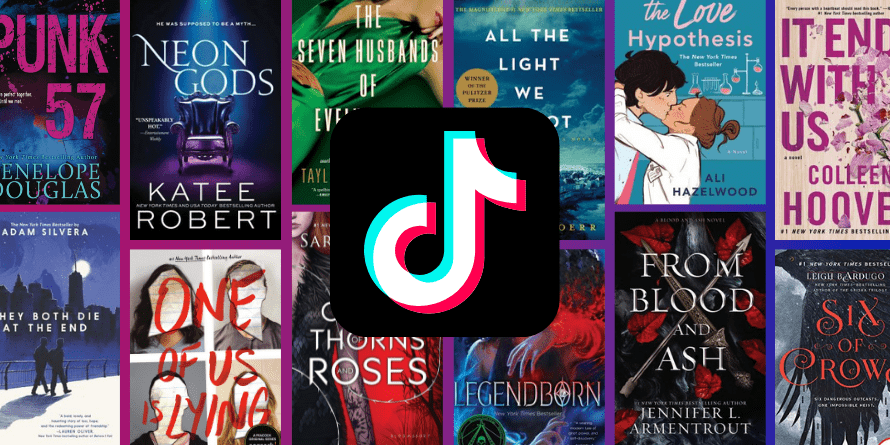Reading for Fun
Rebecca Zaharia // Blog Writer
If you’ve noticed a recent voraciousness for reading in your friends, family, or online, you aren’t alone. We have now entered the era of reading for fun. It seems counterintuitive to say; reading is a hobby, after all, so hasn’t it always been for fun? In my (nonprofessional) opinion: no, reading hasn’t always been perceived as a “fun” activity.

In the past few years, we’ve actually seen a shift in reading habits in the general public. More people are reading, especially younger age demographics. This is in large part due to the COVID-19 pandemic giving people time to explore new hobbies, and no one can deny TikTok’s (specifically BookTok’s) influence on young people reading more. Social media in general is doing wonderful things for marketing in the publishing industry, as well as for giving authors a chance to expand the audience for their books. Reading wasn’t always quite to this level of widespread engagement, however.
Up until recently, reading has generally been associated with school. How many kids have you heard say that school ruined reading for them? Books tend to carry an association with being educational, fulfilling, and enriching—especially if read in a classroom. Those books tend to be a commentary; they tend to have that “classic” vibe propagated by dead white cis male authors. “Good” literature tends to be perceived as something you read in a classroom, something you can pull a deeper truth of the universe out of. Anything less than an analytical standard cannot be considered true, highbrow literature.
One can get carried away with these descriptions. It’s never good practice to make generalizations, especially for a medium as diverse as literature. But this kind of reasoning about books being stiff, boring, complicated, and stuffy is common—any term that can be applied to describe education negatively can also be used for books, as books are education’s primary avenue to pass along knowledge. If someone were to view books in a negative manner, or associate it with other concepts they find negative, then why would they want to read? Or, even if they do want to read, they may find literature to be intimidating; if books are built up as these complex bodies of work to be analyzed, how does someone who doesn’t read often, or who has negative experiences with reading, feel comfortable engaging with stories?
A great way to combat a distaste for reading is to remember this: any reading is better than not at all. You can pull meaning and lessons out of any kind of literature. The biggest concept that explains the growth of reading for pleasure is the shift in what sphere literature occupies in our society. Books have gone through a metamorphosis, exiting the art sphere and entering the entertainment sphere. Literature in previous centuries has been viewed as more closely tied to art, something meant to be dissected and observed and scoured for meaning. They seemed to need to possess artistry and craftsmanship to be considered highbrow. But now, contemporary literature has entered a new era where it is more closely aligned with entertainment (especially in the age of book-to-movie adaptations). Mediums that fall under entertainment can still be all of these traits (artistic, deep, complex, etc.), but they don’t have to be in order to have inherent value. Entertainment exists to engage people, and however creators choose to do that is valuable. Also, what is considered entertaining varies from person to person, so someone might find complex literature entertaining while another person finds romance entertaining. The root reason for reading, though, should always be for fun.

On the note of romance, there’s an interesting phenomenon that perfectly demonstrates how reading for fun should be while also showing people’s hesitation to view reading this way. In general, women are a large demographic of people who read in general, and romance is one of the most popular genres that gets published. Therefore, literature gets associated with both romance and women, and in a patriarchal society, anything viewed through a feminine lens is met with derision. Any reader can read what they want for pleasure, but books (especially romance) are viewed as contrite because of the way we are socialized to view interests with a large female audience as not serious. But that doesn’t mean these kinds of genres or books don’t have value just because they aren’t making a commentary or analyzing the deepest vestiges of humanity’s ethical center. It’s all about how you perceive how reading should be done. There’s no right way to read, but neglecting that reading can be for fun and fun alone is surely a wrong way to read.
As we continue to explore what reading for fun has in store for us, we can already see a love for reading coming back into our consciousness. More indie bookstores are opening up, and social media is abuzz with everyone’s latest reads. Not every book has to be annotated and read with a critical eye anymore. Sometimes, you can read a book and just have fun—have a laugh, see your daydreams on a page, maybe have a cathartic crying session. There’s a literary revival occurring; will you be part of it?
